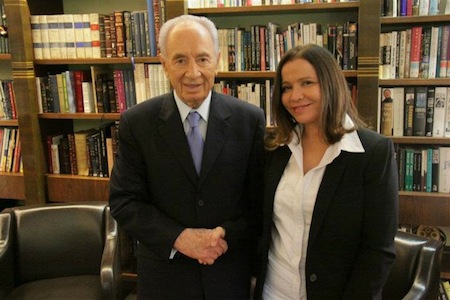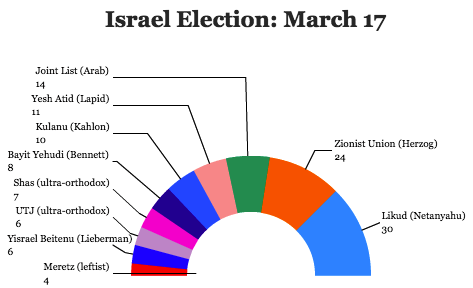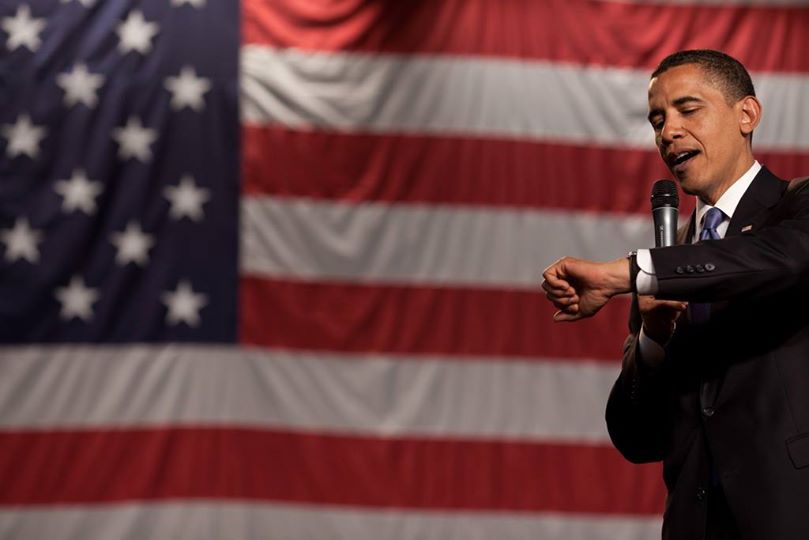
Shelly Yacimovich took over Israel’s Labor Party (מפלגת העבודה הישראלית) in 2011 with a clear message — she would focus on Israeli economic policy, wagering that Israeli voters would welcome a message that has more to do with jobs than jihad, that emphasize incomes over Iran. 
After all, many elections have been won on the maxim of ‘it’s the economy, stupid,’ so it’s not necessarily a bad strategy.
Nonetheless, the conventional wisdom is that Yacimovich’s wager hasn’t worked out, with Labor forecast to win just 17 seats in the latest Haaretz poll in advance of Tuesday’s elections for control of the Knesset (הכנסת), Israel’s 120-seat unicameral parliament, despite the ridiculous fragmentation of the center-left among five parties.
But Labor remains by far in the strongest position among the five center-left parties competing in Tuesday’s election, and given that Labor currently holds just 13 seats in the Knesset, it’s actually somewhat of a triumph.
The prevailing narrative in the campaign so far has been the rise of the very conservative Bayit Yehudi (הבית היהודי, ‘The Jewish Home’) and its leader, Naftali Bennett, who unrepentantly supports new settlements and unrepentantly opposes a two-state solution, and who parted ways with Netanyahu in 2008 after previously serving as his chief of staff.
But there’s a strong case to be made that the elections will be a turning point for the Israeli left.
In the latest Haaretz poll, 47% of voters believe that Israel’s socioeconomic position is the most important issue — in contrast, just 18% cited the Palestinian negotiations, 12% cited exceptions for ultraorthodox haredim to serve in the Israeli Defense Force, and 10% cited the Iranian nuclear weapons program. Meretz (מרצ, ‘Energy’), an even more socially progressive party on the Zionist left, would win six seats, doubling its current representation in the Knesset.
When she became leader in 2011, social justice protestors were agitating throughout Israel over rising costs, income inequality and the stability of public spending on health and education.
Labor’s platform calls for a new 5% estate tax on estates of more than around $4 million (15 million new shekels) and the reintroduction of import duties previously cancelled by the government of current prime minister Benjamin Netanyahu. Those revenues would finance additional funding for health care, education and housing assistance, as well as raising the minimum wage.
Upon assuming the Labor leadership, Yacimovich (pictured above with Israeli president Shimon Peres) was also trying to distinguish herself from her predecessor, Ehud Barak, the former prime minister who left the party in 2011 to continue as Netanyahu’s defense minister. Barak announced late in 2012 that he would not stand for reelection to the Knesset and, while there’s a chance Netanyahu may ask him to return to the defense ministry from outside the Knesset, it seems equally likely that Barak could become the next Israeli ambassador to the United States.
Traditionally a dovish party, Labor nonetheless joined Netanyahu’s government following the 2009 elections, and Barak, who had served under former prime minister Ehud Olmert as defense secretary since 2007, continued in that role for Netanyahu. Unlike Barak, who had a storied career as a leading general in the IDF, Yacimovich was a television journalist before moving into politics.
But though polls show a fairly predictable result on January 22, the real question is whether Netanyahu will pivot to the center or to the right in order to build his governing coalition, and that decision will have perhaps even greater consequences for economic policy than even security policy.
The current snap elections are happening in January, and not later this year, because of the Knesset’s failure to agree to a budget, and so the most pressing issue before the next government — barring any regional security crisis or a surprise military action in Iran or the Gaza Strip– will be Israel’s fiscal situation.
Just last week, the Israeli government announced that its budget deficit would be 4% of GDP, nearly twice as high as expected than expected, so the next government will be under incredible pressure to cut spending or even raise taxes, although Netanyahu’s finance minister Yuval Steinitz has ruled out any new taxes, though education minister Gideon Sa’ar is tipped to replace Steinitz in any new government.
The fiscal discussion will come at a time when Israeli growth is stalling. Although the Israeli economy’s GDP growth estimate for 2012 has edged up to 3.3% from 2.7%, it’s less than the country’s 4.5% growth in 2011 and a trend of the past decade of around 4% to 5% growth.
The Israeli economy is expected to grow this year by an estimated 2.5% or 3%, also well below trend, although newly discovered natural gas deposits could boost the economy by up to 1% of GDP. Moreover, the factors that motivated the 2011 social protests in Israel haven’t disappeared in the meanwhile.
So Yacimovich is right. It really is the economy. Stupid. Continue reading Fiscal, budget issues loom large in Israeli election →
 Photo credit to Marc Israel Sellem / Jerusalem Post.
Photo credit to Marc Israel Sellem / Jerusalem Post.![]()




